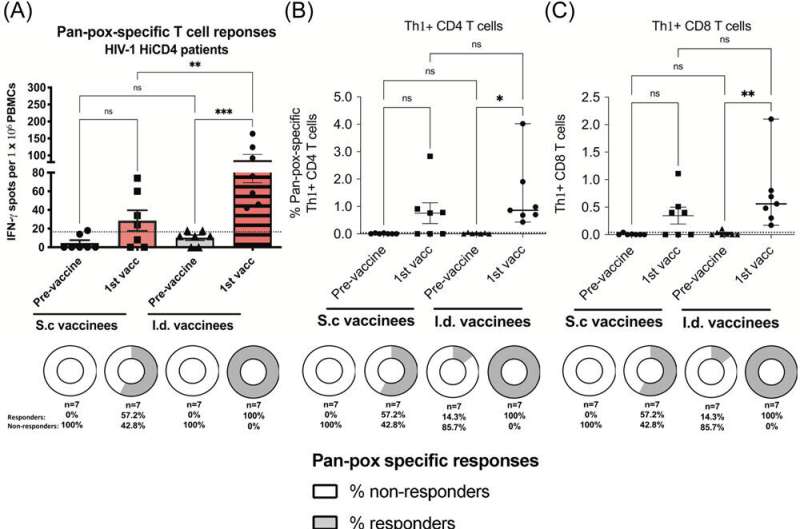This article has been reviewed according to Science X's editorial process and policies. Editors have highlighted the following attributes while ensuring the content's credibility:
fact-checked
trusted source
proofread
Study: Smallpox vaccine efficiently induces immunity against mpox virus infection in people living with HIV

Researchers from the Infection Biology Lab at the Department of Medicine and Life Sciences (MELIS) at Pompeu Fabra University and the HIV Unit at Hospital del Mar Research Institute have shown that intradermal vaccination with the JYNNEOS vaccine against smallpox is the best option to protect people living with HIV from contracting the monkeypox virus.
This route of vaccine administration requires less material to inject each patient, extending the available vaccine doses by a factor of five. The results of this observational study also indicate that individuals with a low level of CD4 T cells, a type of white blood cell essential to properly fight new infections, need a booster dose 28 days after the first dose to compensate for their immunosuppressed status.
Monkeypox (mpox) is a zoonotic virus of the variola virus family that causes smallpox. Mpox causes an infectious disease that can spread autochthonously between humans through direct contact and respiratory routes. The most common symptoms of monkeypox infection are fever, headache, muscle pain, swollen lymph nodes, rash, respiratory and rectal symptoms, and exhaustion. Its severity depends on age and the response of the immune system to resist pathogens and parasites.
Prior to the spring of 2022, monkeypox used to appear in the form of single outbreaks in endemic areas of Central and West Africa, but at this time a global outbreak occurred that facilitated human-to-human transmission. Transmission was mainly between men who had sex with men, a population group with many HIV-infected individuals, who are particularly susceptible to monkeypox virus infection and pathogenicity.
Although there is no specific vaccine against monkeypox, the smallpox vaccine protects eight out of ten people from monkeypox infection due to the antigenic relatedness between the two viruses.
Fighting monkeypox while living with HIV
Results of the study published in the Journal of Medical Virology indicate that the activity of T cells, responsible for the response against pathogens, homeostasis and the system's memory, in HIV-1-infected individuals, whose viral load was controlled by antiretroviral therapy, was enhanced after vaccination with the JYNNEOS smallpox vaccine. T cell responses were equivalent to those of healthy control individuals.
Among individuals living with HIV infection, there is an at-risk group that deserves special attention. It comprises so-called immunological non-responders (INR), individuals who control their viral loads after antiretroviral therapy but only partially recover their CD4 T-lymphocyte count.
"Our study shows that these INRs may need a booster dose 28 days after the first vaccination to generate an efficient T cell response and thus be protected against monkeypox," explains Robert Güerri, the Hospital del Mar clinician who coordinated the vaccination study and is also an associate professor at UPF. Together, the new findings underscore the importance of specific studies on the immune response among people with HIV, especially those with lower CD4 white blood cells.
Vaccine administration routes modulate the immune response
Before the monkeypox outbreak in the spring of 2022, the JYNNEOS vaccine was administered subcutaneously to protect the population. However, due to the increased vaccine demands, in August 2022, American and European health authorities proposed the intradermal administration route of the JYNNEOS vaccine.
Via this route, the vaccine is released into the upper layer of the skin, where many immune cells are located. Most importantly, this procedure extends the available vaccine doses by a factor of five, increasing vaccine availability without compromising its efficacy.
In contrast to the T-cell response of HIV-1-infected individuals who received the JYNNEOS vaccine subcutaneously, all individuals who received the vaccine intradermally generated a significant T-cell response. Therefore, intradermal vaccination was more effective in activating specific antiviral immunity.
"Our results clearly support the proposed dose-sparing vaccination route also for the protection of immunocompromised individuals who need the vaccine the most," adds Andreas Meyerhans, an ICREA researcher and UPF full professor, who coordinated the experimental part of the study.
This study provides an early indication of how best to proceed with preventive vaccination against monkeypox in a group of individuals at high risk of infection. However, further studies should confirm and expand on the observations derived from a small number of vaccinated individuals.
More information: Marta Sisteré‐Oró et al, Pan‐pox‐specific T‐cell responses in HIV‐1‐infected individuals after JYNNEOS vaccination, Journal of Medical Virology (2023). DOI: 10.1002/jmv.29317




















